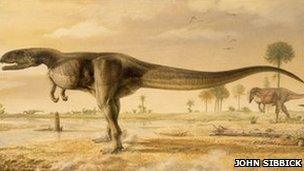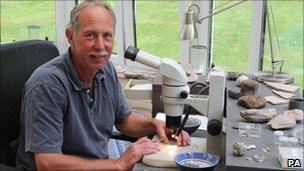Isle of Wight home to thousands of dinosaur remains
- Published

The island is named alongside Egypt, Mongolia, the USA and Argentina as the top places to find dinosaur remains
The Isle of Wight is home to the richest source of "pick 'n' mix" dinosaur remains anywhere in the world, a study has suggested.
Weather conditions 130 million years ago have been suggested as one reason why thousands of small teeth and bones lie buried alongside bigger fossils.
Portsmouth University palaeontologist Dr Steve Sweetman and Dr Allan Insole from Bristol University led the study.
Dr Sweetman said remains were "unique" to the island.
The research has been published in the journal Palaeogeography, Palaeoclimatology, Palaeoecology.
Preservation of bones
During the Early Cretaceous period when dinosaurs roamed, the Isle of Wight's geographical position was roughly where Gibraltar is now.
Scientists believe the remains were brought together due to the ferocious weather conditions and floods at the time.

Dr Sweetman believes remains came together due to ferocious weather conditions
"These swept up all loose objects in their path, swallowed complete dinosaur skeletons and eroded floodplain sediments," Dr Sweetman said.
"The more debris and sediment the water collected the thicker and thicker it became until eventually it was like mixed concrete."
This was then deposited in hollows to form what are now known as the island's plant debris beds which provided ideal conditions for the preservation of bones.
Dr Sweetman said: "On the Isle of Wight you get a complete muddle of the smallest fossils blended with the biggest, nothing quite like it has been seen anywhere else in the world.
"The plant debris beds and the mixture of fossils they contain are unique to the island."
In 2005 the Isle of Wight was named as one of the most important sites in the world for dinosaur finds.
It was named alongside Egypt, Mongolia, the USA and Argentina by the National Geographic magazine as the top places to find dinosaur remains.